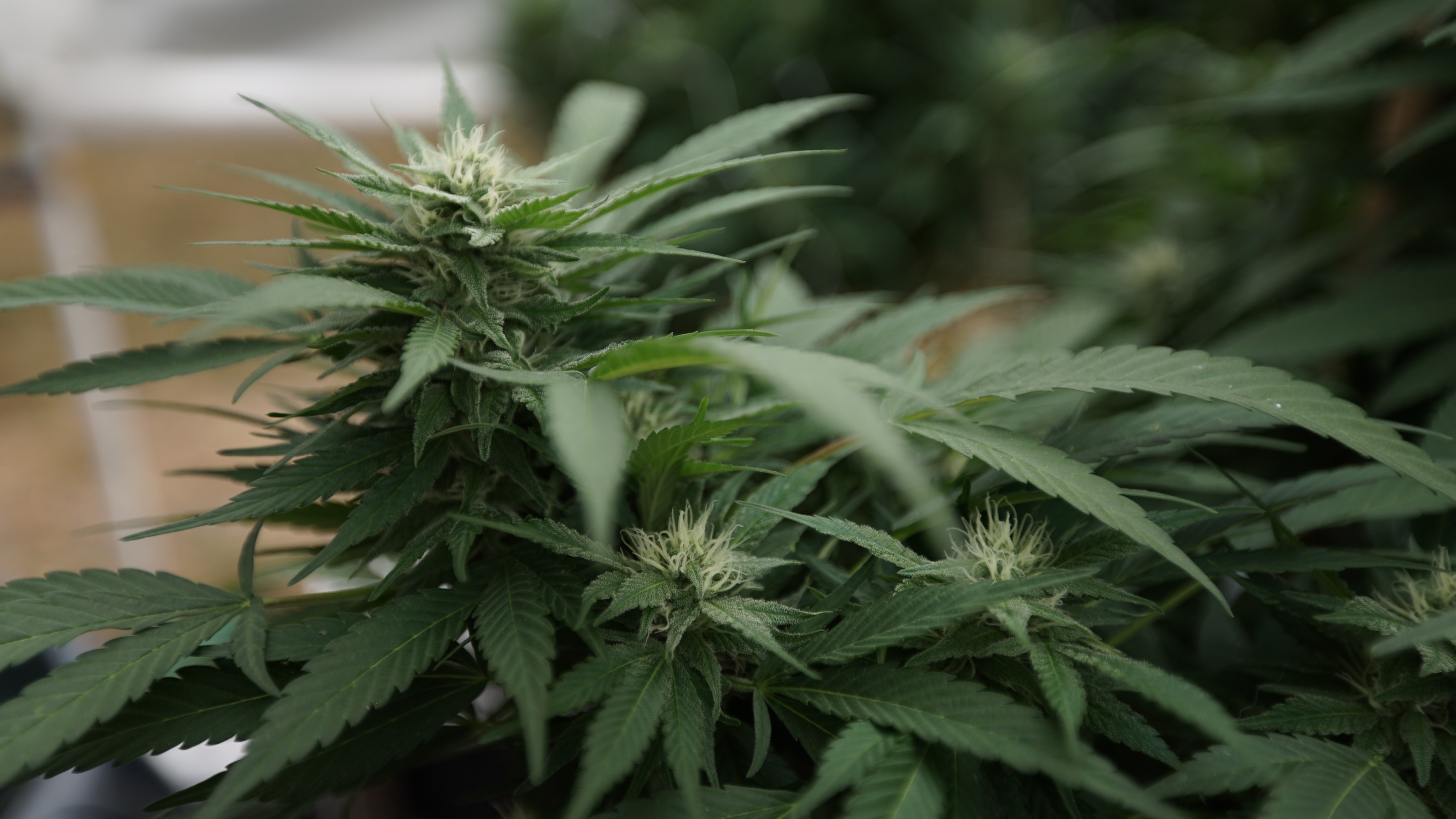Politics
Advocates Divided On New Hampshire Marijuana Legalization Bill As Senate-Amended Measure Gets Final House Vote On Thursday

Marijuana reform advocates in New Hampshire are at odds over how they want lawmakers to proceed with a Senate-amended legalization bill that will return the House for a final vote this week. Representatives can choose to accept the Senate amendments—which would advance the measure to Gov. Chris Sununu (R)—vote down the legislation entirely or send it to a bicameral conference committee in an attempt to hammer out a compromise.
A range of issues separate the House- and Senate-passed versions of the bill. Generally the Senate measure takes a more conservative approach, establishing new or harsher criminal penalties for public consumption of marijuana, use in a car—including by passengers—and unintentional sales to a minor. The House version, by contrast, includes a higher possession amount (four ounces instead of the Senate’s two) and would exempt medical marijuana products from a 15 percent state surcharge on cannabis sales.
A number of other topics hang in the balance, including the basic regulatory model for the cannabis industry, how existing medical marijuana businesses could participate in the adult-use market and how many of the legislation’s 15 allowed retailers any one person or entity could control.
In an op-ed published this week in Marijuana Moment, advocates with the state ACLU chapter and the Marijuana Policy Project (MPP) who’ve poured hours into lobbying lawmakers on the bill said the current version represents an imperfect but nevertheless important reform in New Hampshire, urging House lawmakers to accept the Senate changes and move the legislation along.
Other advocates, however, as well as the proposal’s lead sponsor, Rep. Erica Layon (R), say the House shouldn’t sign off on the amendments.
Looming over the disagreement are rumblings that if the House rejects the Senate changes and sends the bill, HB 1633, to a conference committee, Senate President Jeb Bradley (R)—who opposes legalization—would likely appoint prohibitionists to the panel who could effectively quash the plan.
The governor, for his part, has signaled that he would accept the Senate-amended bill but opposed an iteration passed by the House in April. But the Sununu’s term is up next year, and the candidate currently leading in the polls, former U.S. Sen. Kelly Ayotte (R), has said she would opposed legalization if elected.
“The House should not let this opportunity slip away,” wrote advocates in the recent op-ed, including former state Rep. Tim Egan, who led the House Democratic Cannabis Caucus while in office; ACLU of New Hampshire Executive Director Devon Chaffee; and Karen O’Keefe, director of state policies for MPP.
“We have advocated for legalization for many years and the Senate bill is far from our model,” their piece says. “But the NH Senate’s HB 1633 is still an important step forward. It would legalize something that over 70 percent of Granite Staters agree should be legal and would prevent further human suffering.”
“With uncertainty on the horizon, including new state senators and a new governor in 2025,” it continues, “it is vitally important that the House seize this opportunity to legalize cannabis and increase freedom.”
Other advocates have sharply disagreed—including the New Hampshire Cannabis Association (NHCann), an organization for which Egan chairs the board.
In an email to supporters last week, NHCann’s founder, Daryl Eames, called the Senate-amended version of the legislation a “Soviet Weed” bill that’s “wrong for New Hampshire,” adding that senators had “warped it beyond recognition.”
Among other changes, the Senate adjustments shifted the bill’s regulatory model to a franchise system, under which the government would control the look, feel and general operations of each retail store, with the state Liquor Commission even having final authority to set prices. Some critics have called for a more free-market model.
“This legislation, as amended, does not serve the interests of New Hampshire residents who are desperate for economic opportunity to improve their lives in the face of soaring costs all around them and instead, creates incredible barriers to entry that serve the wealthy and connected,” Eames said in a statement. “We strongly encourage representatives to stand up for the House’s version of HB 1633 and vote ‘no’ on concurrence.”
Egan, Chaffee and O’Keefe say a House vote against concurrence would likely doom the reform.
“We fear that a committee of conference would kill the bill,” they wrote. “The Senate president has repeatedly made it clear he would prefer HB 1633 die. And under Senate rules, he has complete control over who gets assigned to any committee of conference. If the conference committee does not agree on a new version, the bill dies. Members can refuse to sign a report and kill the bill.”
Senate President Bradley didn’t directly answer a local reporter this week when asked whether the House would be “taking a risk” by sending the bill to a conference committee.
“Well, I expect I would be on a committee of conference to adhere to the Senate position,” he told WMUR, “which is something that I think is much more in line with Gov. Sununu’s position than where the House bill is.”
“We’ll see what happens,” he said.
Regarding the potential for negotiations with the @NHHouseofReps over @TheNHSenate's version of HB 1633 cannabis legalization @SenJeb says: "I expect I would be on a committee of conference to adhere to the senate position…" #NHPolitics #WMUR pic.twitter.com/hEIbYxLzNH
— Adam Sexton (@AdamSextonWMUR) May 28, 2024
In the State House, however, it’s not just lawmakers opposed to legalization who’d like to see the bill fizzle out. Layon, the sponsor who spent most of this year working to build consensus on her proposal, now says she also wants to see the measure fail.
“I would like to kill my own bill, because this will make things worse,” she told New Hampshire Public Radio (NHPR) in a report over the weekend. “I’m going to get up and speak against my own bill.”
Others in the House have said Layon isn’t alone in wanting to abandon the bill.
“I think there are already a huge number of Democrats and Republicans who are ready to vote against this bill,” Rep. Anita Burroughs (D), a co-sponsor of the House bill, told NHPR.
“I did kind of a loosey-goosey survey not too long ago, and I found at least 50 of my Democratic colleagues are going to vote to non-concur, and I think there are more Republicans who are going to non-concur,” she added in comments to The Keene Sentinel. “If I was a betting person, I would say a majority are going to non-concur.”
“I will support a committee of conference because if there’s a way we can salvage it, I’m all for it,” Burroughs said, “but frankly, I’m not optimistic.”
O’Keefe at the advocacy group Marijuana Policy Project said that rejecting the Senate bill could delay legalization in New Hampshire indefinitely.
“I wonder what path those urging the House not to concur see for legalization if there’s a Gov. Ayotte or Morse?” she told Marijuana Moment, referring to another gubernatorial candidate, former state Sen. Chuck Morse (R), who opposes the reform. “If HB 1633 dies, I see no likelihood of legalization during their administrations—certainly not in their early years. That would mean no protections for child custody, medical care, and professional licensing. That’s a huge gamble.”
“HB 1633 is far better than the status quo for cannabis consumers. It stops citations and arrests, including possible jail time, for possession of up to 2 oz of cannabis starting January 1, 2026,” O’Keefe continued. “It also prevents people from losing their professions, children, and medical care—including possibly their lives if they are denied organ transplants—for responsible cannabis use.
“While I dislike many of the regulatory choices in the Senate version,” she said, “if legal sales are ultimately implemented (in this form or another), it would allow NH cannabis consumers to buy their cannabis much closer to home.”
Burroughs, however, says she’s ready to risk a hard reset on the legalization push.
“For me, I’m willing to take the crapshoot,” she told NHPR, “and hope that we have a governor who is willing to legalize cannabis in a more ‘Live Free or Die’ way.”
Deputy House Majority Leader Fred Doucette (R) wrote recently in an op-ed for the NH Journal that lawmakers should approve the bill, noting that “this may be the last chance we get for years to do it.”
“It’s simple,” Doucette wrote. “We in the House have a ‘binary choice.’ By concurring with the Senate, this policy of legalization goes on to the governor’s desk. If we failed to concur, this will most certainly go to a biased committee of conference where it will certainly die once again.”
He noted that it’s the first session ever in which the Senate has signed off on a legalization proposal.
“No matter what disagreements (and all of us have them) with specifics in this piece of legislation, I offer this,” Doucette wrote: “‘Policy over Perfection.’ Let’s concur and pass the ‘policy’ component of cannabis legalization. With that policy placed into law, we can then address the imperfections we have with this specific piece of legislation.”
Amid the ongoing disagreement, other lawmakers predict this simply may not be the year that New Hampshire legalizes marijuana.
“In all likelihood, cannabis legalization does not happen this year,” Rep. Jonah Wheeler (D), a co-sponsor of the bill, told The Keene Sentinel this week. “I think that’s what people are going to have to come to terms with.”
Sen. Daryl Abbas (R), who chaired a state commission on legalization late last year, worked alongside Bradley in recent weeks to make amendments both lawmakers agreed improved the bill. Asked how he felt about the possibility that the Senate president could ultimately torpedo the plan in a conference committee, Abbas told Marijuana Moment: “I don’t comment on rumors.”
“I will wait and see what the House does,” he added, “but I’m not optimistic this would survive a committee of conference.”
Sununu’s office, for its part, did not respond to a request for comment sent Tuesday asking what the governor would like to see House lawmakers do with the bill.
Matt Simon, director of public and government relations at medical marijuana provider GraniteLeaf Cannabis, didn’t say explicitly whether he opposes the bill in its current form, but he told Marijuana Moment in an email this week that “New Hampshire’s cannabis community will certainly not be celebrating if the House concurs with the Senate’s amendments.”
“I think representatives have some very good reasons for being concerned about the Senate’s amendment to HB 1633,” Simon said. “One is that the Therapeutic Cannabis Program will face a very uncertain future if it becomes law. We’ve been trying for months to work out a compromise with legislators, but the Senate’s amendment eliminated key provisions that we considered essential.”
Referring to advocates’ op-ed in favor of the House concurring with the Senate plan, Simon noted he noted that it “acknowledges that the bill contains serious flaws, so it is clear that representatives who support legalization will face a difficult choice on Thursday.”
(Disclosure: Simon supports Marijuana Moment’s work via a monthly Patreon pledge.)
In its current version, the proposal would allow 15 franchise stores to open statewide. Purchases would incur a 15 percent “franchise fee”—effectively a tax—that would apply to both adult-use and medical marijuana purchases. Though stores would be privately run, the government would control their look, feel and operations.
The proposal would limit each municipality to only a single cannabis retail establishment unless it’s home to more than 50,000 people, though only two cities in the state, Manchester and Nashua, meet that threshold. Local voters would also need to pre-approve the industry in order for businesses to open in that jurisdiction.
Adults could possess up to two ounces of marijuana. Home cultivation of cannabis for personal use would remain illegal, and the state’s Cannabis Control Commission would have the authority to enforce that provision.
Smoking or vaping marijuana in public would be a violation on the first offense and an misdemeanor for second or subsequent offenses within five years—a charge that could carry jail time. It would also outlaw consumption of cannabis by any means, including edibles, by any driver or passenger of a vehicle. That would also be an unclassified misdemeanor with the potential for jail time.
As passed by the House, the legislation would have legalized through a so-called “agency store” model proposed by Layon, in which the state would oversee a system of privately run stores.
The franchise plan was a reformulation of a more directly state-run retail model first put forth by Sununu, though the governor has said he’ll also support a franchise model. It’s an approach that was first raised last year by a state commission on legalization that ultimately failed at its assignment to develop a legislative proposal.
New Hampshire lawmakers worked extensively on marijuana reform issues last session and attempted to reach a compromise to enact legalization through a multi-tiered system that would include state-controlled shops, dual licensing for existing medical cannabis dispensaries and businesses privately licensed to individuals by state agencies. The legislature ultimately hit an impasse on the complex legislation.
Bicameral lawmakers also convened the state commission tasked with studying legalization and proposing a path forward last year, though the group ultimately failed to arrive at a consensus or propose final legislation.
Last May, the House defeated marijuana legalization language that was included in a Medicaid expansion bill. The Senate also moved to table another piece of legislation that month that would have allowed patients and designated caregivers to cultivate up to three mature plants, three immature plants and 12 seedlings for personal therapeutic use.
After the Senate rejected the reform bills in 2022, the House included legalization language as an amendment to separate criminal justice-related legislation—but that was also struck down in the opposite chamber.
This story has been updated to correct the descriptions of the Senate-proposed penalties for public consumption of marijuana and consumption in a vehicle.
South African President Signs Marijuana Legalization Bill Into Law
Photo courtesy of Chris Wallis // Side Pocket Images.
















